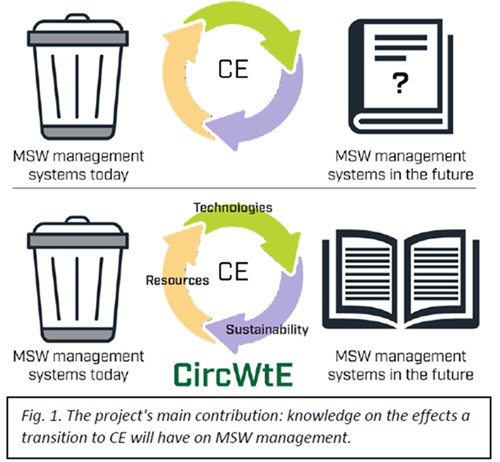CircWtE in a nutshell
CircWtE is a knowledge-building project involving industrial and public actors all along the MSW management value chain. The project is starting in June 2021 and will last until 2024 with a total budget of approx. 2.5 million €. The project is funded by the Research Council of Norway (Grant number 319795) and the partners CIVAC, Franzefoss Gjenvinning AS, NOAH AS, REG Oslo, Tafjord Kraftvarme AS and Trøndelag fylkeskommune. The project owner is SINTEF Energi AS; the other R&D partners being SINTEF Industri and NTNU (Norwegian University of Science and Technology).
Norway is 2.4% circular (2020) so there is substantial room for improvement. Increasing circularity will require a complete re-organisation of our society bringing challenges but also opportunities. When implementing Circular Economy (CE) principles, radical changes can be expected both concerning MSW properties and amounts but also MSW treatment value chains. CE unfolding will have consequences on existing Waste-to-energy plants and the energy market but will also offer new business opportunities for the sector. The CE action plan related to MSW can be summarized with these key actions and targets:
- Attain 65% material recycling rate by 2035 (with specific sub-targets)
- Implement separate collection and handling of specific fractions.
- Reduce food wastage MSW is at the centre of a complex web of interests.
However, some targets are in conflict, e.g., less WtE will mean less renewable energy. While the Norwegian government may facilitate the implementation of CE by defining a national strategy, R&D should help the sector to benefit from rather than await this (r)evolution. The future will be affected by regulatory frameworks but also societal evolution and technological developments. The relative importance of these factors is currently unknown and hence need to be quantified to optimise the route to CE. This project will help the WtE/waste management sector by (1) mapping MSW resources now and in future plausible CE scenarios, (2) evaluating technical solutions, existing and alternative, according to CE-relevant indicators, (3) incorporate these elements in a value-chain approach investigating environmental and socioeconomic impacts.
The main objective is to determine how future MSW management systems will look like in the CE and what impact CE will have on MSW-based energy production. This project will help industrial and public actors make strategic choices and investments decisions for well-designed, CE-integrated waste management systems.



